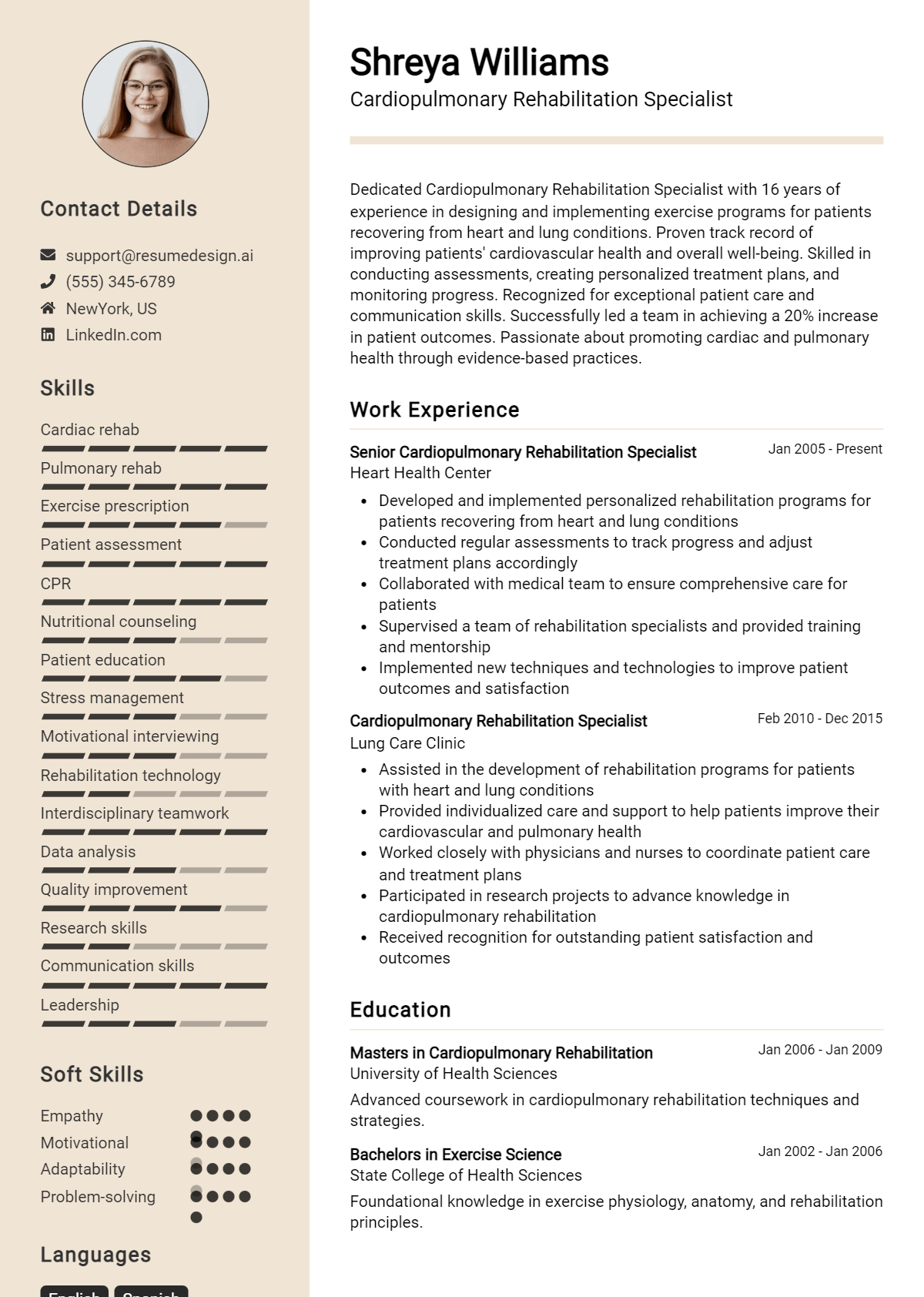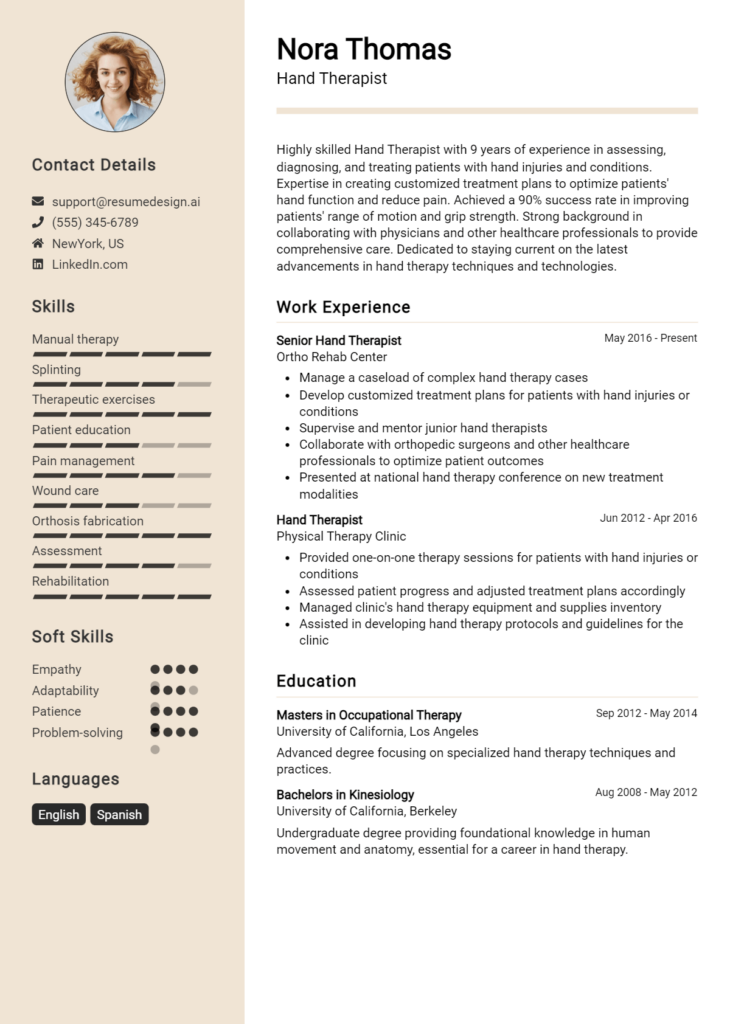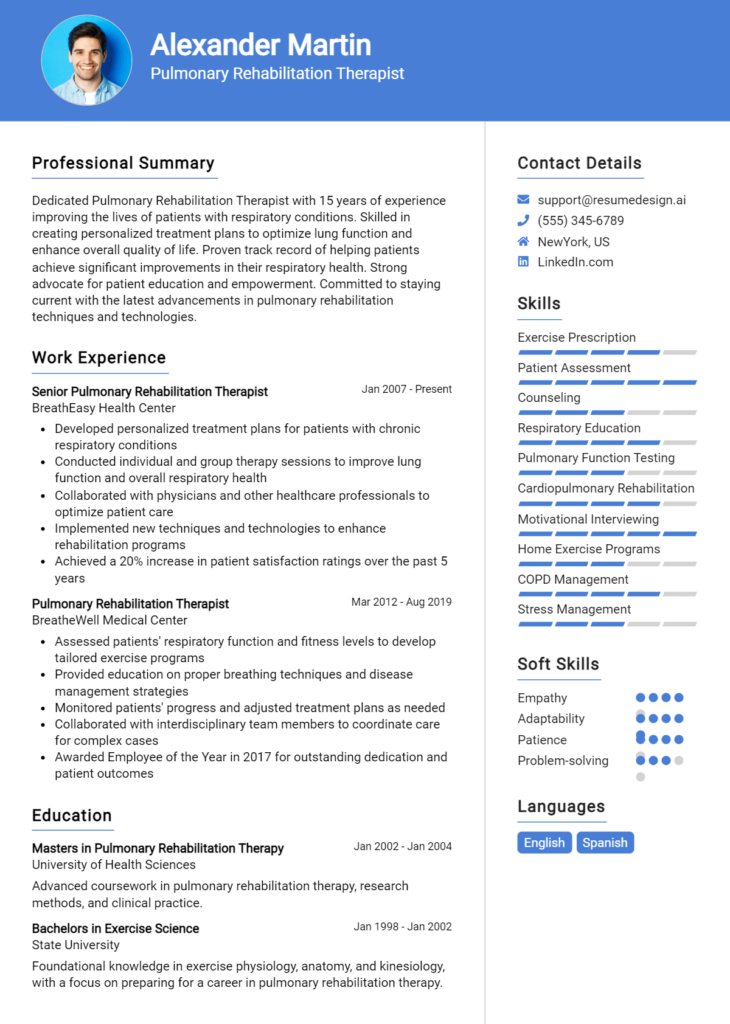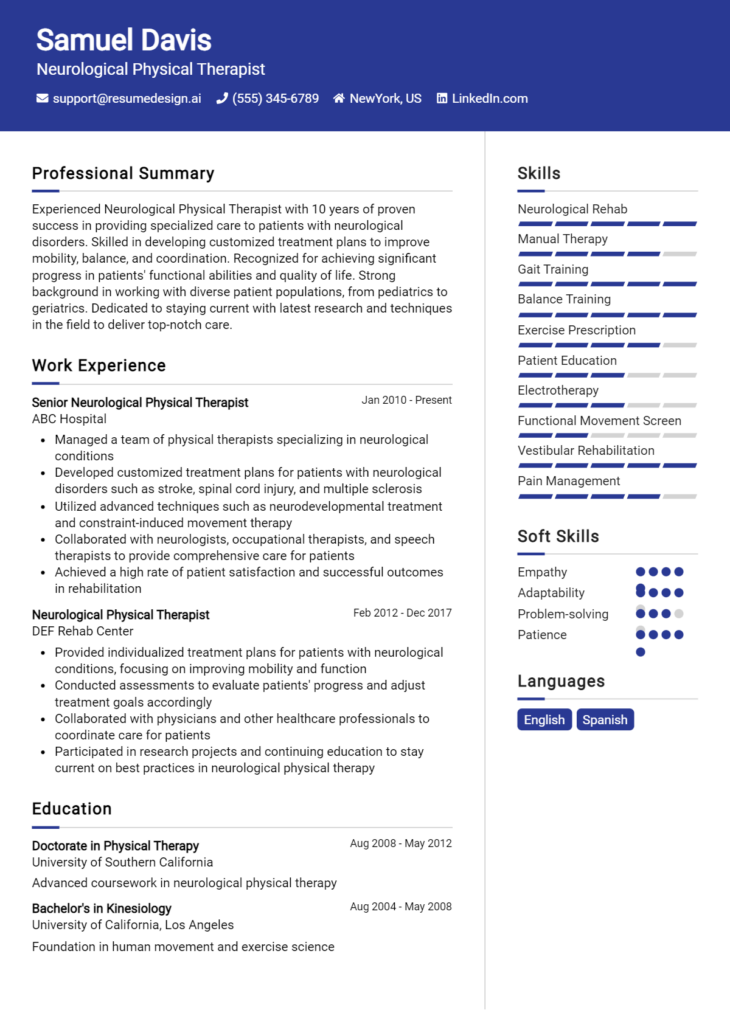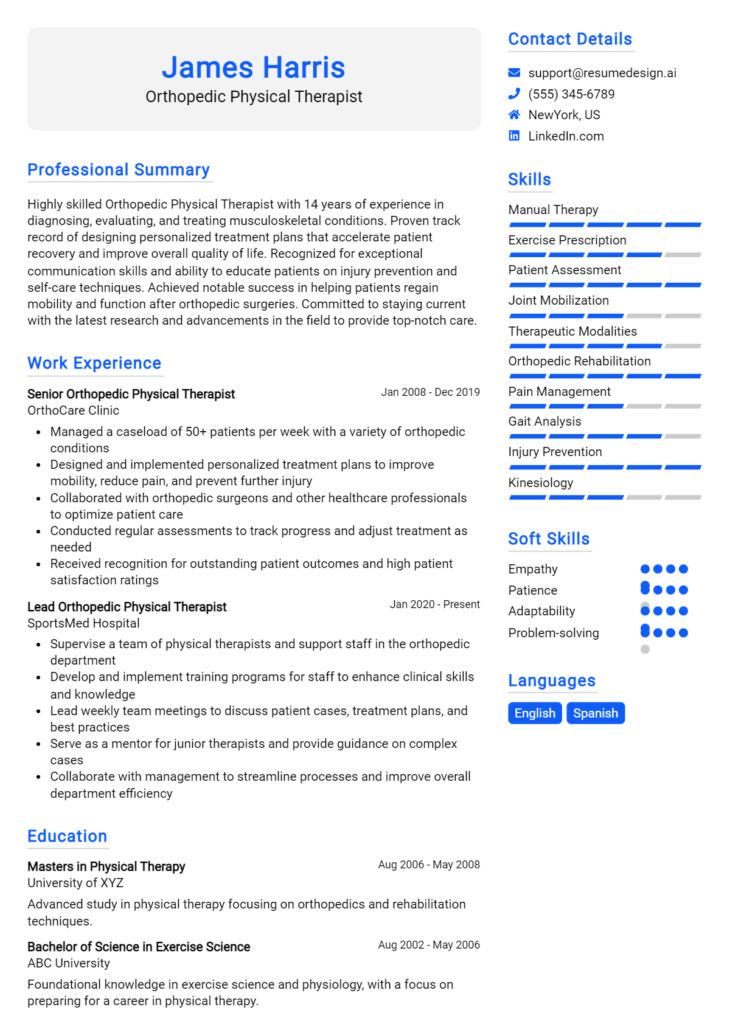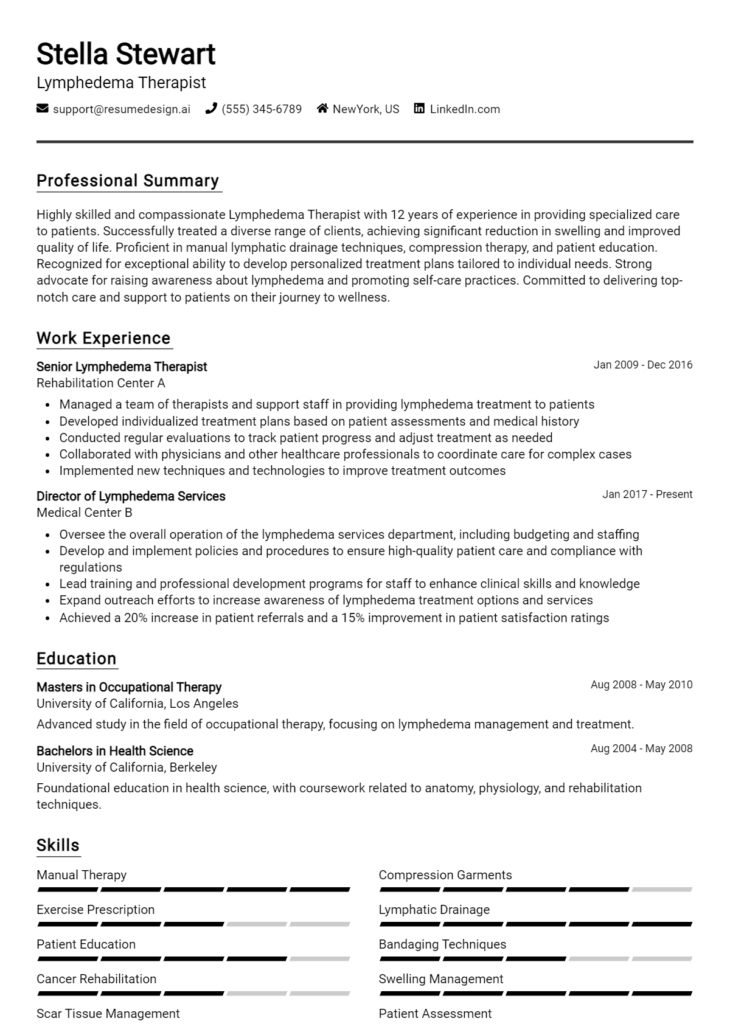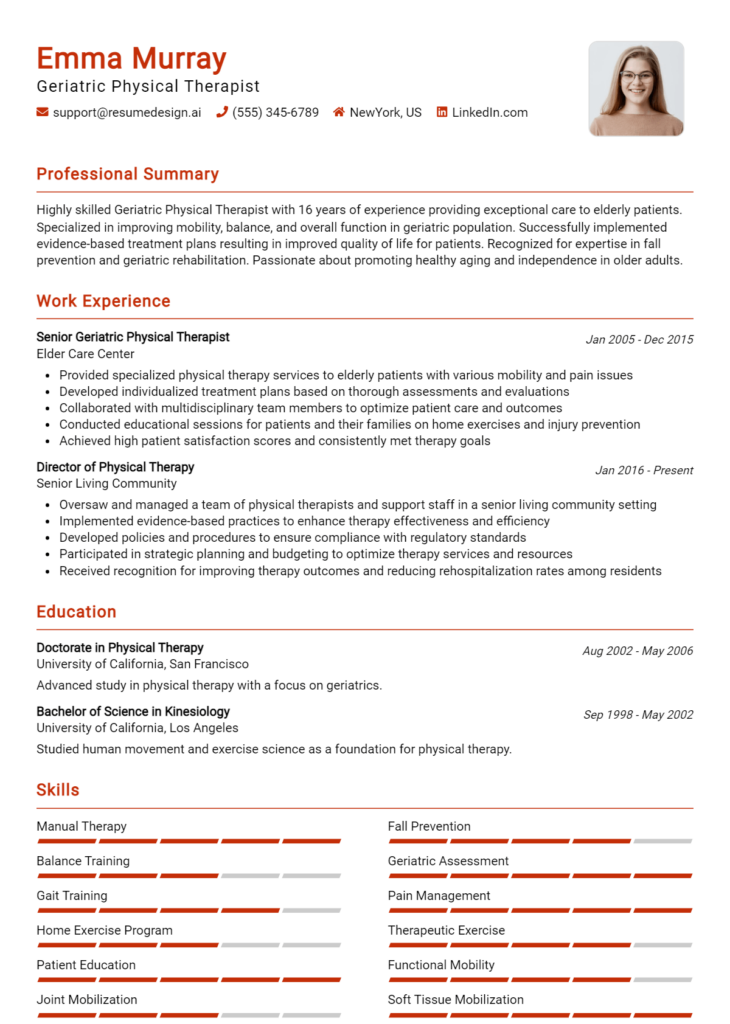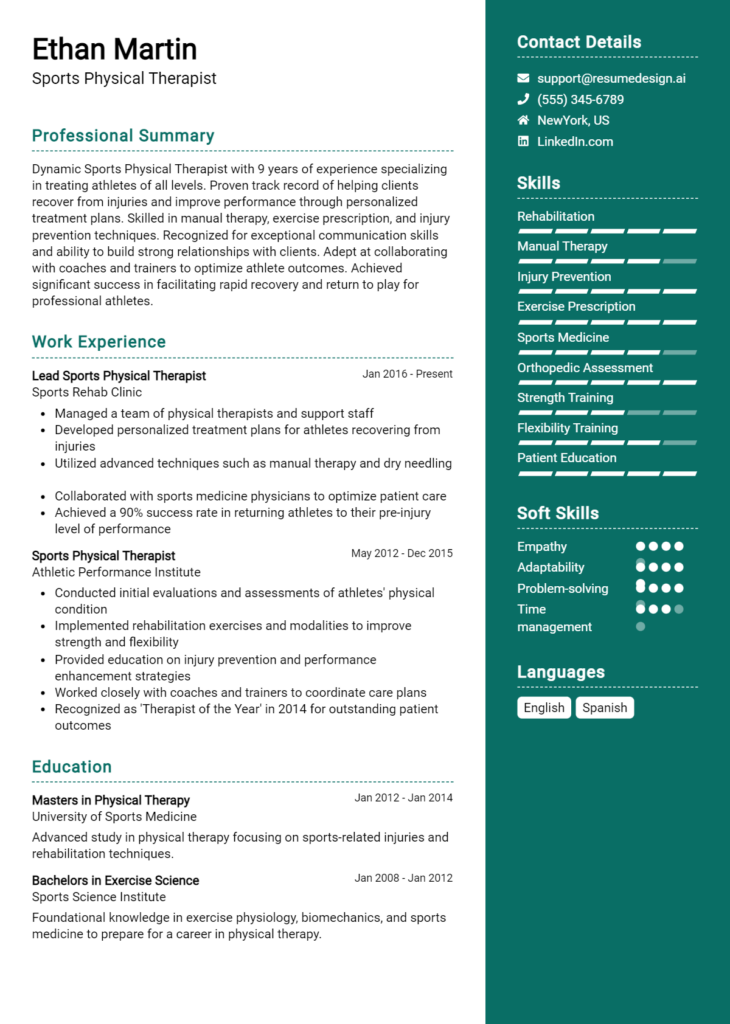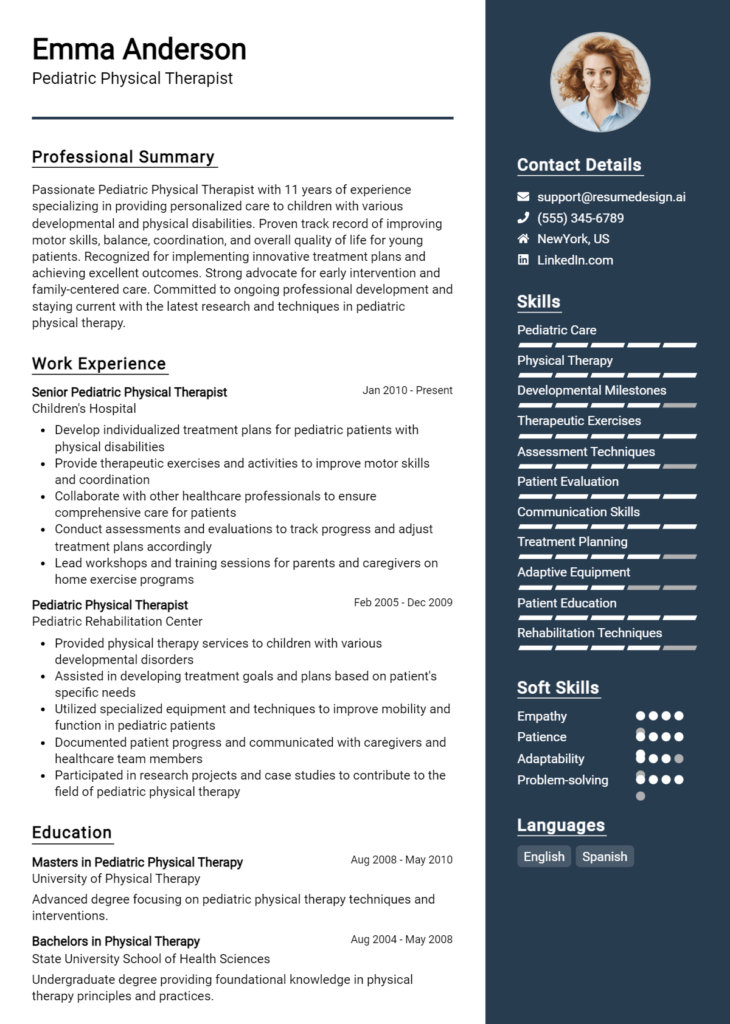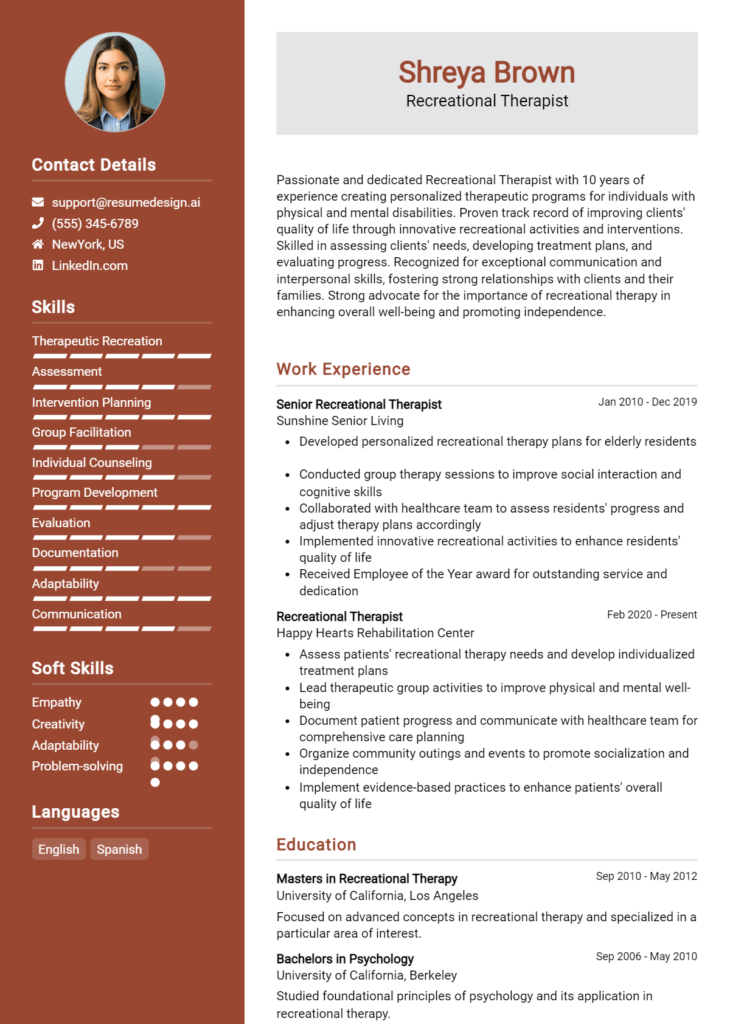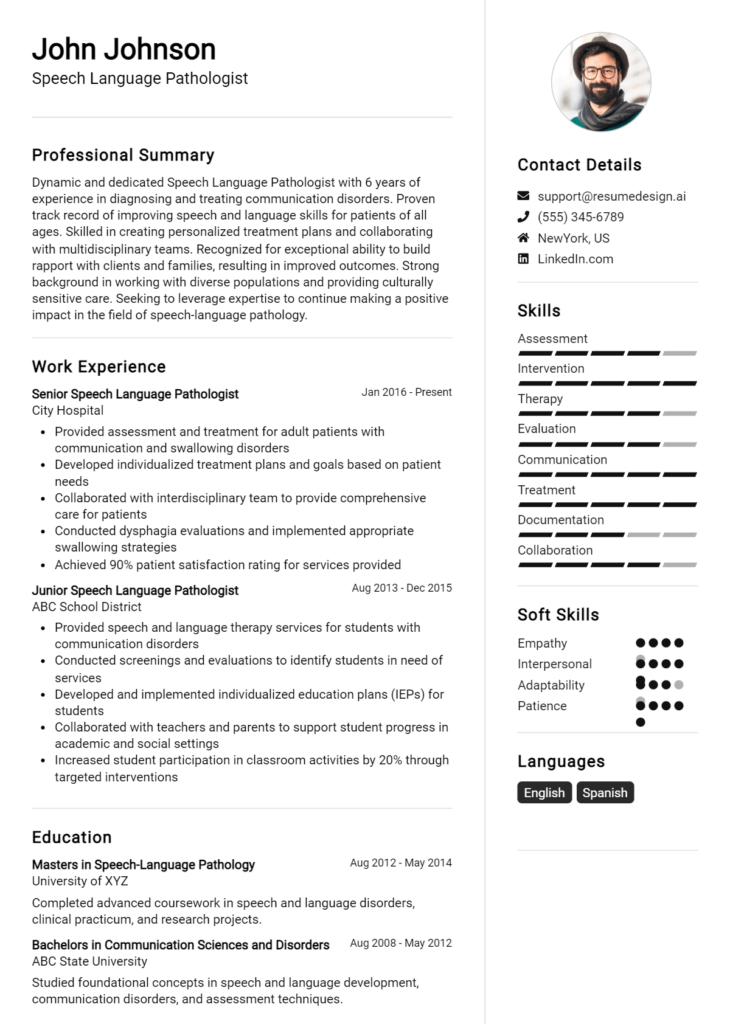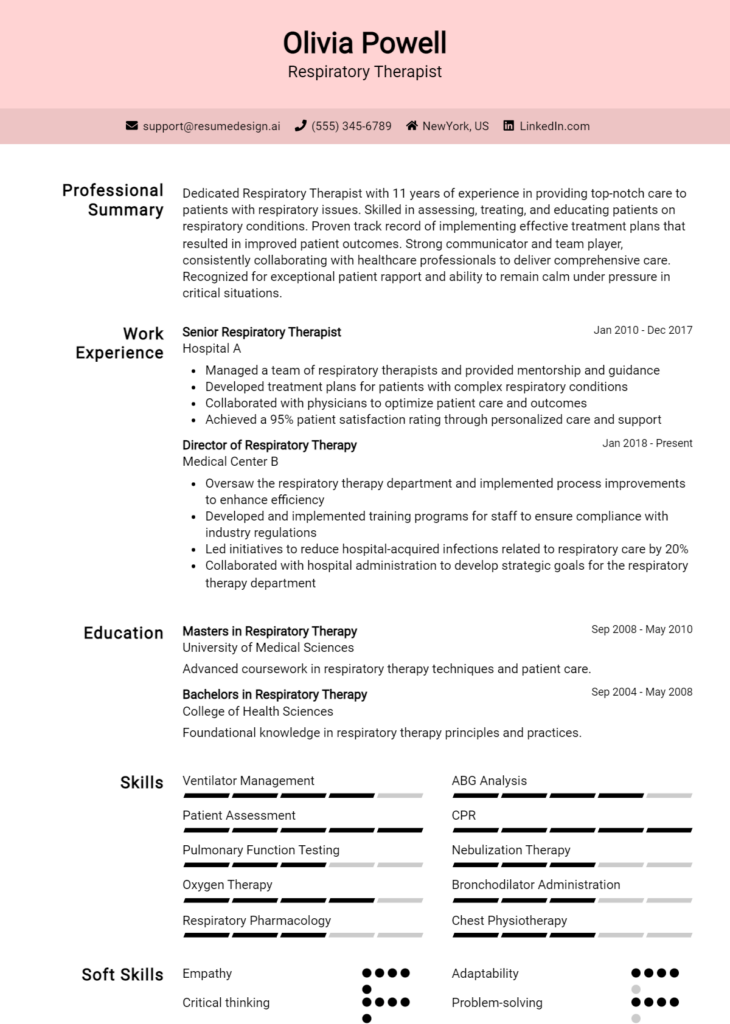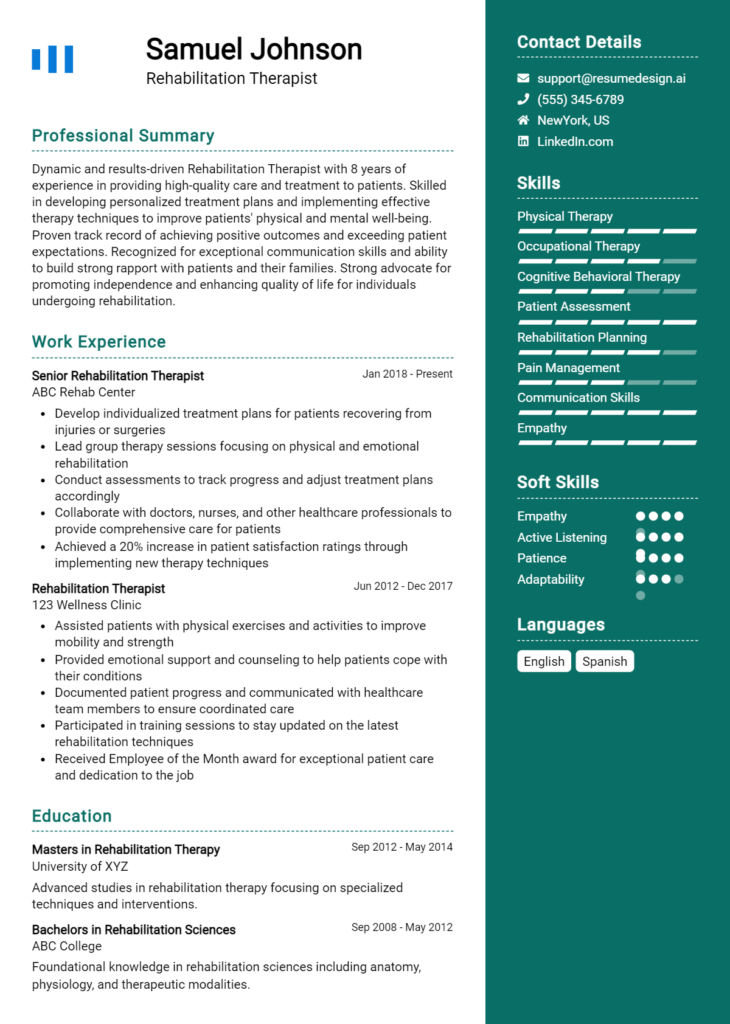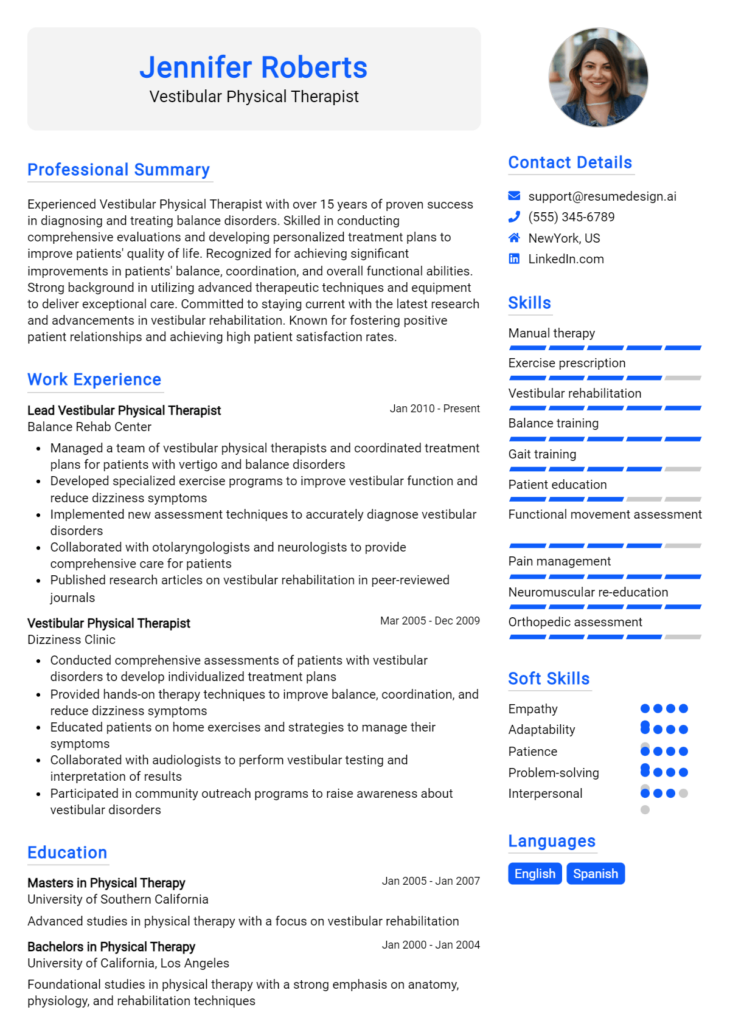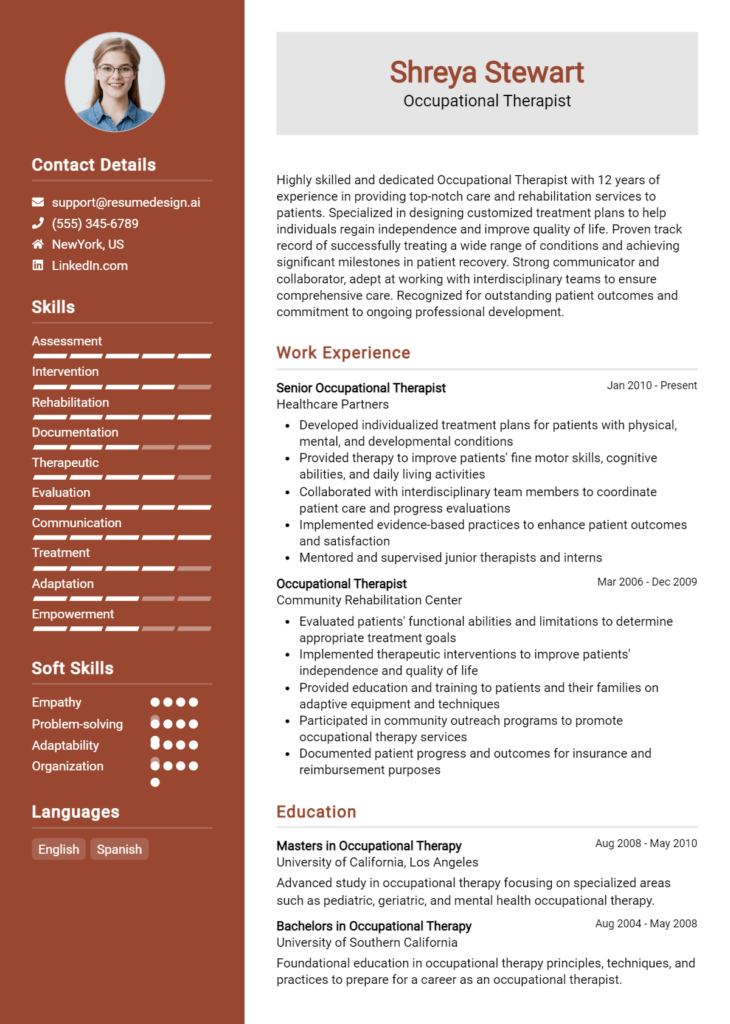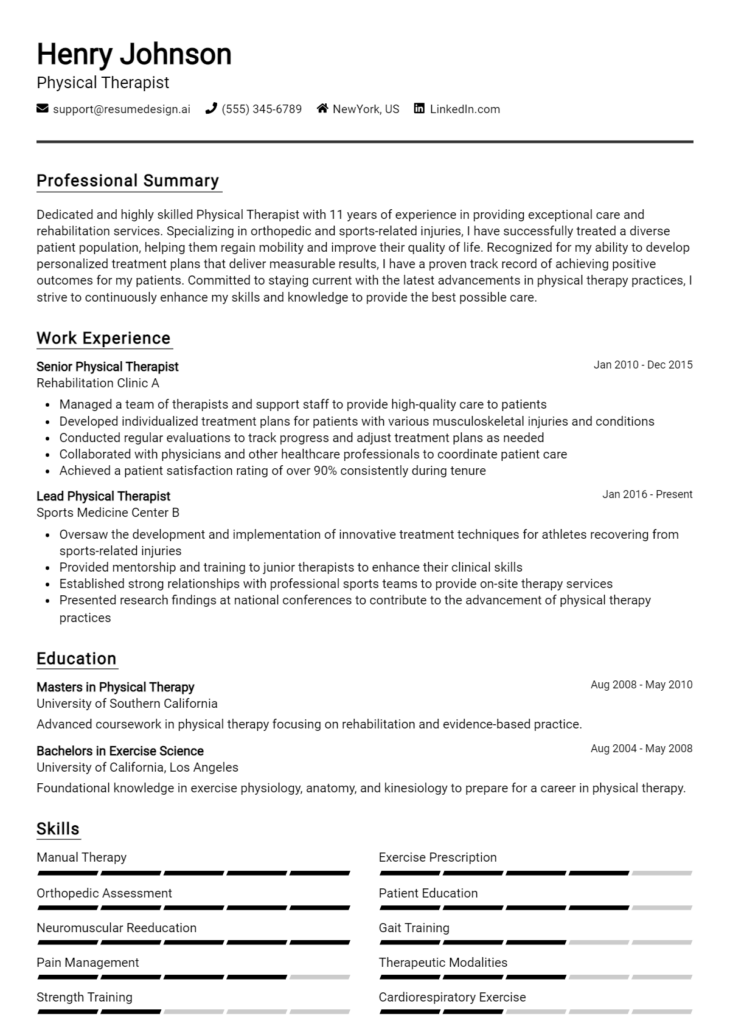Cardiopulmonary Rehabilitation Specialist Core Responsibilities
A Cardiopulmonary Rehabilitation Specialist plays a crucial role in enhancing patient recovery through comprehensive care plans and rehabilitation programs. Key responsibilities include conducting assessments, developing personalized exercise regimens, and monitoring patients' progress. This role demands strong technical expertise in cardiopulmonary physiology, operational skills for program management, and problem-solving abilities to address complex patient needs. By collaborating with diverse healthcare teams, specialists contribute significantly to organizational goals, making a well-structured resume essential to highlight these qualifications effectively.
Common Responsibilities Listed on Cardiopulmonary Rehabilitation Specialist Resume
- Conduct assessments of patients' cardiovascular and pulmonary health.
- Develop and implement individualized rehabilitation programs.
- Monitor patients’ progress and adjust treatment plans accordingly.
- Educate patients on lifestyle modifications and disease management.
- Collaborate with physicians, nurses, and other healthcare professionals.
- Document patient progress and communicate findings to the healthcare team.
- Provide support and counseling to patients and their families.
- Ensure compliance with safety and regulatory standards during rehabilitation.
- Analyze data to evaluate the effectiveness of rehabilitation programs.
- Participate in research or quality improvement initiatives.
- Stay updated on advancements in cardiopulmonary rehabilitation techniques.
High-Level Resume Tips for Cardiopulmonary Rehabilitation Specialist Professionals
A well-crafted resume is crucial for Cardiopulmonary Rehabilitation Specialist professionals, as it often serves as the first impression a candidate makes on potential employers. This document not only showcases an applicant's qualifications but also reflects their dedication to the field and their ability to contribute effectively to a healthcare team. A resume must clearly articulate both skills and achievements, demonstrating the unique qualifications that set a candidate apart. In this guide, we will provide practical and actionable resume tips specifically tailored for Cardiopulmonary Rehabilitation Specialist professionals, helping you to present your best self to prospective employers.
Top Resume Tips for Cardiopulmonary Rehabilitation Specialist Professionals
- Tailor your resume to each job description by using keywords and phrases that match the specific requirements of the position.
- Highlight relevant experience in cardiopulmonary rehabilitation, including internships, volunteer work, and previous job roles.
- Quantify your achievements, such as the number of patients treated or improvements in patient outcomes, to provide a clear picture of your impact.
- Showcase industry-specific skills, such as knowledge of exercise physiology, patient assessment techniques, and familiarity with rehabilitation equipment.
- Include certifications and licenses relevant to cardiopulmonary rehabilitation, emphasizing your commitment to professional development.
- Utilize a clean, professional format that enhances readability and draws attention to key accomplishments.
- Incorporate a strong summary statement at the top of your resume that captures your experience, skills, and career objectives.
- Use action verbs to convey your responsibilities and achievements effectively, making your contributions compelling to potential employers.
- Be concise and focused; limit your resume to one or two pages while ensuring all pertinent information is included.
- Proofread your resume thoroughly to eliminate any errors that could undermine your professionalism and attention to detail.
Implementing these tips can significantly increase your chances of landing a job in the Cardiopulmonary Rehabilitation Specialist field. A well-structured and targeted resume not only highlights your qualifications but also demonstrates your commitment to providing high-quality patient care. By effectively showcasing your skills and achievements, you position yourself as a strong candidate in a competitive job market.
Why Resume Headlines & Titles are Important for Cardiopulmonary Rehabilitation Specialist
In the competitive field of cardiopulmonary rehabilitation, a well-crafted resume headline or title plays a crucial role in capturing the attention of hiring managers. This brief yet powerful phrase serves as the first impression of a candidate, summarizing their key qualifications and areas of expertise in a manner that is both concise and relevant. A strong headline not only highlights the candidate's skills and experience but also aligns directly with the job being applied for, making it easier for employers to see the potential value the candidate can bring to their team. By effectively conveying essential information in just a few words, a compelling resume headline can set the stage for further engagement and elevate a candidate's chances of landing an interview.
Best Practices for Crafting Resume Headlines for Cardiopulmonary Rehabilitation Specialist
- Keep it concise: Aim for a headline that is clear and to the point, ideally no longer than a single sentence.
- Be role-specific: Tailor the headline to reflect the specific position of cardiopulmonary rehabilitation specialist.
- Highlight key skills: Include the most relevant skills that align with the job description.
- Use impactful language: Choose strong action verbs and adjectives to convey confidence and expertise.
- Incorporate keywords: Use industry-specific terms that match the job listing to enhance visibility.
- Focus on results: If possible, mention measurable outcomes or achievements related to previous roles.
- Avoid jargon: Ensure the headline is easily understandable and avoids overly technical language.
- Reflect your unique value: Consider what sets you apart from other candidates and incorporate that into your headline.
Example Resume Headlines for Cardiopulmonary Rehabilitation Specialist
Strong Resume Headlines
Certified Cardiopulmonary Rehabilitation Specialist with 5+ Years of Experience in Patient Care and Program Development
Dynamic Healthcare Professional Specializing in Cardiopulmonary Rehabilitation and Patient Education
Results-Driven Cardiopulmonary Rehabilitation Specialist Committed to Improving Patient Outcomes through Evidence-Based Practices
Weak Resume Headlines
Looking for a Job in Healthcare
Experienced Worker
The strong headlines presented above are effective because they clearly communicate the candidate’s specific expertise and achievements, making them immediately relevant to the role of a cardiopulmonary rehabilitation specialist. They use specific language, highlight experience, and focus on outcomes that resonate with hiring managers. In contrast, the weak headlines fail to impress due to their vagueness and lack of specificity. They do not offer any insight into the candidate's qualifications or how they align with the job, making them less likely to capture the interest of potential employers.
Writing an Exceptional Cardiopulmonary Rehabilitation Specialist Resume Summary
A well-crafted resume summary is crucial for a Cardiopulmonary Rehabilitation Specialist, as it serves as the first impression for hiring managers. This concise introduction quickly captures their attention by highlighting key skills, relevant experience, and notable accomplishments that align with the job role. An impactful summary not only showcases the candidate's qualifications but also demonstrates their understanding of the specific needs of the position. Therefore, it should be tailored to the job description, ensuring it resonates with the employer and sets the stage for the rest of the resume.
Best Practices for Writing a Cardiopulmonary Rehabilitation Specialist Resume Summary
- Quantify Achievements: Use numbers and statistics to highlight your successes, such as patient recovery rates or program participation increases.
- Focus on Relevant Skills: Emphasize skills that are directly applicable to cardiopulmonary rehabilitation, such as patient assessment, exercise prescription, and patient education.
- Tailor the Summary: Customize the summary for each job application to reflect the specific requirements and language of the job description.
- Be Concise: Keep the summary brief, ideally within 3-5 sentences, to maintain the reader's interest.
- Use Action Verbs: Start sentences with strong action verbs to convey a sense of dynamism and proactivity.
- Highlight Certifications: Include any relevant certifications or licenses that are pertinent to cardiopulmonary rehabilitation.
- Showcase Team Collaboration: Mention experience working with multidisciplinary teams, emphasizing your ability to collaborate effectively with healthcare professionals.
- Demonstrate Empathy and Communication: Highlight your ability to connect with patients and communicate complex information clearly.
Example Cardiopulmonary Rehabilitation Specialist Resume Summaries
Strong Resume Summaries
Dedicated Cardiopulmonary Rehabilitation Specialist with over 5 years of experience in developing and implementing patient-centered rehabilitation programs. Successfully improved patient recovery rates by 30% through personalized exercise plans and close monitoring of progress.
Compassionate healthcare professional with a proven track record in enhancing patient outcomes in cardiopulmonary rehabilitation. Achieved a 25% increase in patient adherence to rehabilitation protocols by introducing innovative educational workshops and one-on-one coaching.
Results-driven Cardiopulmonary Rehabilitation Specialist with expertise in patient assessment and tailored exercise prescription. Led a team that reduced hospital readmission rates by 15%, demonstrating strong collaboration with healthcare providers and ongoing patient support.
Weak Resume Summaries
Experienced healthcare worker looking for a job in rehabilitation. I have some skills that might be useful.
I want to help patients recover and have some experience in rehabilitation programs. I am a good team player.
The strong resume summaries are considered effective because they provide specific metrics, demonstrate relevant skills, and directly relate to the cardiopulmonary rehabilitation role. They showcase measurable achievements and paint a clear picture of the candidate's impact in previous positions. In contrast, the weak summaries lack detail, specificity, and quantifiable outcomes, making them too generic and less compelling to potential employers.
Work Experience Section for Cardiopulmonary Rehabilitation Specialist Resume
The work experience section of a Cardiopulmonary Rehabilitation Specialist resume is crucial as it provides a comprehensive overview of the candidate's professional journey and expertise in the field. This section is essential for showcasing technical skills, demonstrating the ability to manage teams effectively, and delivering high-quality rehabilitation services. By quantifying achievements and aligning experiences with industry standards, candidates can present a compelling case for their qualifications and readiness to contribute to patient care and rehabilitation outcomes.
Best Practices for Cardiopulmonary Rehabilitation Specialist Work Experience
- Highlight specific technical skills related to cardiopulmonary rehabilitation, such as knowledge of exercise prescription and patient assessment techniques.
- Quantify achievements where possible, using metrics to demonstrate the impact of your work on patient outcomes or program effectiveness.
- Showcase leadership experiences, including managing teams or mentoring junior staff in rehabilitation settings.
- Detail collaboration with multidisciplinary teams to enhance patient care and improve service delivery.
- Use action verbs to convey a sense of initiative and responsibility in your role.
- Align your experiences with industry standards and best practices to demonstrate compliance and awareness of current trends.
- Include relevant certifications or specialized training that enhances your qualifications in cardiopulmonary rehabilitation.
- Tailor your work experience to reflect the job description and requirements of the position you are applying for.
Example Work Experiences for Cardiopulmonary Rehabilitation Specialist
Strong Experiences
- Developed and implemented a comprehensive exercise program that improved patient functional capacity by 30% over a six-month period.
- Led a team of five rehabilitation specialists in delivering patient-centered care, resulting in a 25% increase in patient satisfaction scores.
- Collaborated with cardiologists and nursing staff to streamline patient assessments, reducing evaluation times by 15% and enhancing care efficiency.
- Conducted a research study on the effectiveness of tele-rehabilitation, leading to a 40% increase in patient engagement during remote sessions.
Weak Experiences
- Worked with patients in a rehabilitation setting.
- Helped with program development and patient care.
- Participated in team meetings and contributed ideas.
- Assisted in various rehabilitation activities and tasks.
The examples listed as strong experiences are considered effective because they quantify achievements and demonstrate clear outcomes, showcasing leadership and collaboration in a concrete manner. In contrast, the weak experiences are vague and lack detail, failing to illustrate the candidate's specific contributions or the impact of their work, which diminishes their effectiveness in a competitive job market.
Education and Certifications Section for Cardiopulmonary Rehabilitation Specialist Resume
The education and certifications section of a Cardiopulmonary Rehabilitation Specialist resume is crucial for demonstrating the candidate's academic foundation, professional qualifications, and commitment to ongoing development in the field. This section serves to showcase relevant degrees, industry-recognized certifications, and specialized training that directly align with the responsibilities of the role. By providing detailed information on coursework and credentials, candidates can significantly enhance their credibility and illustrate their dedication to delivering high-quality care in cardiopulmonary rehabilitation.
Best Practices for Cardiopulmonary Rehabilitation Specialist Education and Certifications
- List relevant degrees such as a Bachelor's or Master's in Exercise Science, Kinesiology, or a related field.
- Include certifications from recognized organizations, such as the American Association of Cardiovascular and Pulmonary Rehabilitation (AACVPR).
- Highlight specialized training, such as pulmonary rehabilitation courses or cardiac rehabilitation certifications.
- Provide detailed descriptions of relevant coursework that emphasizes foundational knowledge and skills.
- Update certifications regularly to reflect continuous learning and adherence to industry standards.
- Utilize clear and concise language, focusing on qualifications that directly enhance your candidacy for the role.
- Order your education and certifications chronologically or by relevance to ensure clarity and ease of reading.
- Consider including any honors or distinctions earned during your education to further bolster your qualifications.
Example Education and Certifications for Cardiopulmonary Rehabilitation Specialist
Strong Examples
- Bachelor of Science in Exercise Science, University of Health Sciences, Graduated May 2022
- Certified Cardiac Rehabilitation Specialist (CCRS), American Association of Cardiovascular and Pulmonary Rehabilitation, 2023
- Advanced Certification in Pulmonary Rehabilitation, National Board for Certification in Respiratory Care, 2023
- Coursework in Pathophysiology and Exercise Physiology, University of Health Sciences
Weak Examples
- Associate Degree in General Studies, Community College, Graduated 2018
- Certification in Basic Life Support (BLS), American Heart Association, 2015
- Online Course in Yoga for Beginners, 2021
- High School Diploma, Graduated 2010
The strong examples are considered effective because they directly relate to the skills and knowledge necessary for a Cardiopulmonary Rehabilitation Specialist, showcasing both relevant degrees and specialized certifications that reflect the candidate's expertise in the field. Conversely, the weak examples lack relevance to the role, featuring outdated or general qualifications that do not demonstrate a focused commitment to cardiopulmonary rehabilitation, thus potentially diminishing the candidate's appeal to employers.
Top Skills & Keywords for Cardiopulmonary Rehabilitation Specialist Resume
In the competitive field of cardiopulmonary rehabilitation, a well-crafted resume is vital for showcasing your skills and expertise. The role of a Cardiopulmonary Rehabilitation Specialist requires a unique blend of both hard and soft skills to effectively support patients in their recovery journey. Highlighting these skills on your resume not only demonstrates your qualifications but also emphasizes your ability to connect with patients, collaborate with healthcare teams, and deliver high-quality care. Understanding the key skills necessary for this role can significantly enhance your chances of landing an interview and ultimately securing a position that impacts patients' lives positively.
Top Hard & Soft Skills for Cardiopulmonary Rehabilitation Specialist
Soft Skills
- Empathy and Compassion
- Strong Communication Skills
- Active Listening
- Team Collaboration
- Problem-Solving Abilities
- Patience and Understanding
- Adaptability and Flexibility
- Time Management
- Motivational Skills
- Attention to Detail
- Conflict Resolution
- Interpersonal Skills
- Cultural Competence
- Professionalism
Hard Skills
- Knowledge of Cardiopulmonary Anatomy and Physiology
- Proficiency in Exercise Prescription
- Cardiac Monitoring Techniques
- Respiratory Therapy Techniques
- Patient Assessment Skills
- CPR and First Aid Certification
- Data Analysis and Interpretation
- Understanding of Medical Terminology
- Familiarity with Rehabilitation Equipment
- Ability to Create Customized Rehabilitation Plans
- Knowledge of Nutrition and Lifestyle Counseling
- Electronic Health Record (EHR) Management
- Familiarity with Clinical Guidelines and Protocols
- Research Skills in Evidence-Based Practices
Incorporating these skills into your resume will not only make you stand out to potential employers but also reflect your comprehensive understanding of the essential functions of a Cardiopulmonary Rehabilitation Specialist. Additionally, showcasing relevant work experience can further substantiate your qualifications and commitment to patient care.
Stand Out with a Winning Cardiopulmonary Rehabilitation Specialist Cover Letter
I am excited to apply for the Cardiopulmonary Rehabilitation Specialist position at [Company Name]. With a strong background in exercise physiology and patient care, combined with my passion for improving the quality of life for individuals with cardiovascular and pulmonary conditions, I am confident in my ability to contribute effectively to your team. My experience working with diverse patient populations has equipped me with the skills to design and implement personalized rehabilitation programs that promote recovery and enhance overall well-being.
In my previous role at [Previous Company Name], I successfully developed and led comprehensive rehabilitation programs tailored to patients recovering from cardiac surgeries and chronic lung diseases. By utilizing evidence-based practices, I monitored patient progress, adjusted exercise regimens as necessary, and provided education on lifestyle modifications to promote long-term health. My collaborative approach involved working closely with interdisciplinary teams, including physicians, nurses, and dietitians, to ensure a holistic approach to patient care. This experience has honed my ability to communicate complex medical information in an understandable way, fostering a supportive environment for patients and their families.
I am particularly drawn to the mission of [Company Name] to provide compassionate and innovative care. I believe that my dedication to patient advocacy and my ability to motivate individuals through their rehabilitation journeys align perfectly with your organization's values. I am eager to bring my expertise in cardiopulmonary rehabilitation, along with my enthusiasm for patient-centered care, to your team. Together, I am confident that we can help patients achieve their health goals and improve their quality of life.
Thank you for considering my application. I look forward to the opportunity to discuss how my background and passion for cardiopulmonary rehabilitation can contribute to the success of [Company Name]. I am excited about the possibility of collaborating with your team to make a meaningful impact in the lives of our patients.
Common Mistakes to Avoid in a Cardiopulmonary Rehabilitation Specialist Resume
When crafting a resume for a Cardiopulmonary Rehabilitation Specialist position, it's essential to highlight relevant skills and experiences effectively. However, many applicants make common mistakes that can hinder their chances of landing an interview. Avoiding these pitfalls can significantly enhance the quality of your resume, allowing you to present yourself as a strong candidate. Here are some frequent errors to watch out for:
Lack of Tailoring: Failing to customize your resume for the specific job can result in a generic impression. Ensure you highlight experiences and skills that align with the job description.
Overly Technical Language: While it's important to demonstrate your expertise, using excessive jargon can alienate hiring managers. Aim for clear, concise language that conveys your qualifications without overwhelming the reader.
Ignoring Quantifiable Achievements: Simply listing duties without showcasing measurable outcomes can weaken your resume. Use specific metrics, such as the number of patients treated or improvements in patient outcomes, to illustrate your impact.
Inconsistent Formatting: Inconsistencies in font size, style, or spacing can make your resume appear unprofessional. Maintain uniform formatting throughout to enhance readability and presentation.
Neglecting Soft Skills: Cardiopulmonary rehabilitation requires strong interpersonal skills. Failing to mention attributes like empathy, communication, and teamwork can leave out crucial aspects of your candidacy.
Not Including Relevant Certifications: Certifications are vital in this field. Omitting relevant credentials can make you seem less qualified. Be sure to list all applicable certifications, such as BLS or ACLS, prominently.
Using Passive Language: Phrasing your responsibilities in passive voice can diminish their impact. Use active language to convey ownership of your accomplishments and responsibilities clearly.
Excessive Length: A resume that is too long can deter hiring managers from reading it in full. Keep your document concise, ideally one page, focusing on the most relevant information to the position.
Conclusion
As a Cardiopulmonary Rehabilitation Specialist, you play a crucial role in helping patients recover and improve their cardiovascular and pulmonary health. This article has explored the essential skills and qualifications required for this profession, including a deep understanding of exercise physiology, patient assessment, and the ability to create personalized rehabilitation programs.
Additionally, we discussed the importance of effective communication and collaboration with healthcare teams to ensure that patients receive comprehensive care. Furthermore, the article emphasized staying updated with the latest advancements in cardiopulmonary rehabilitation techniques and patient management strategies.
In conclusion, as you reflect on your career and the impact you can make in the lives of patients, take a moment to review and enhance your Cardiopulmonary Rehabilitation Specialist resume. Highlight your unique skills and experiences to stand out in a competitive job market.
To assist you in this process, consider utilizing available resources such as resume templates, resume builder, resume examples, and cover letter templates. These tools can help streamline the creation of a polished and professional resume that showcases your expertise and commitment to patient care. Take action today to elevate your career in cardiopulmonary rehabilitation!

